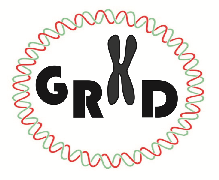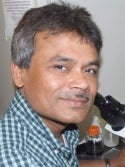Center for Gene Regulation in Health and Disease (GRHD)
Mailing Address
Center for Gene Regulation in Health and Disease (GRHD)
2121 Euclid Avenue, SR 259
Cleveland, OH 44115
Campus Location
2351 Euclid Avenue
Science and Research Building, Room 259
Phone: (216) 687-2516
Fax: (216) 687-5549

Dr. Barsanjit Mazumder

Dr. Barsanjit Mazumder
Professor
Location: SR 263
Phone: (216) 687-2435
Fax: (216) 687-6972
b.mazumder@csuohio.edu
My laboratory at Cleveland State University is interested to study the endogenous cellular mechanisms to control inflammation. Using cellular and tissue-specific gene knockout mice model we discovered a unique translation regulation mechanism in the cells of innate immune systems. This mechanism depends on the stimulus dependent release of ribosomal protein L13a from the large ribosomal subunit and formation of an multi-protein RNA-binding complex. This complex targets a group of highly inflammatory chemokine and chemokine receptors (Members of this novel Post-Transcriptional Operon) harboring a specific cis-acting element in their 3'-untranslated regions and efficiently silence their translation. Recent studies from our laboratory using myeloid-specific L13a Knockout mice showed that genetic abrogation of this mechanism significantly increases the susceptibility to many inflammatory disease such as Endotoxemia, Atherosclerosis and Ulcertive Colitis.
In addition my laboratory is also interested to study the Mechanism of Ribosome Biogenesis and the Role of Cellular Proteins in Viral gene Expression.
Antara Roy
PhD Student
Location: SR 269
216-523-7552
a.roy20@vikes.csuohio.edu
Danny Venorsky
Undergraduate Student
Location: SR 269
216-523-7552
d.venorsky@vikes.csuohio.edu
Articles in Peer-reviewed Journals
1. A. Basu, N. Dvorina, W. M. Baldwin, III and B. Mazumder*. High-fat diet-induced GAIT element-mediated translational silencing of mRNAs encoding inflammatory proteins in macrophage protects against atherosclerosis. The FASEB Journal, 34, 6888-6906, 2020.
2. R. Kour, A. A. Komar and B. Mazumder*. Mutually exclusive amino acid residues of L13a are responsible for its ribosomal incorporation and translational silencing leading to resolution of inflammation. RNA, 25, 1377-1392, 2019.
3. B. Mazumder. GAITing the GUT. Cellular and Molecular Immunology, 15, 1082-1084, 2018.
4. A. Basu, N. Jain, B. S. Tolbert, A. A. Komar and B. Mazumder*. Conserved structures formed by heterogeneous RNA sequences drive silencing of an inflammation responsive post-transcriptional operon Nucleic Acid Research, 45, 12987-13003, 2017.
5. A. Golovko, A. Kojukhov, B. J. Guan, B. Morpurgo, W. C. Merrick, B. Mazumder, M. Hatzoglou and A. A. Komar. The eIF2A knockout mouse. Cell Cycle, 15, 3115-3120, 2016.
6. D. Poddar, R. Kour, W. M. Baldwin, III and B. Mazumder. L13a-dependent translational control in macrophages limits the pathogenesis of colitis. Cellular and Molecular Immunology. Advance online publication, 13 July 2015; doi:10.1038/cmi.2015.53.
7. B. Mazumder, D. Poddar, A. Basu, R. Kour, V. Verbovetskaya and S. Barik*. Extra-ribosomal L13a is a specific innate immune factor for antiviral defense. Journal of Virology, 88, 9100-9110, 2014. (Covered as spotlight on the same issue).
8. A. Basu, D. Poddar, P. Robinet, J. Smith, M. Febbraio, W. M. Baldwin, III and B. Mazumder. Ribosomal Protein L13a deficiency in macrophages promotes atherosclerosis by limiting translation control-dependent retardation of inflammation. Atherosclerosis, Thrombosis and Vascular Biology, 34, 533-542, 2014.
9. P. Das, A. Basu, A. Biswas, D. Poddar, J. Andrews, S. Barik, A. A. Komar and B. Mazumder. Insights into the mechanism of ribosomal incorporation of mammalian L13a protein during ribosome biogenesis. Molecular & Cellular Biology, 33, 2829- 2842, 2013.
10. D. Poddar, A. Basu, W. M. Baldwin III, R. V. Kondratov, S. Barik and B. Mazumder. An Extraribosomal Function of Ribosomal Protein L13a in Macrophages Resolves Inflammation. Journal of Immunology, 190, 3600-3612, 2013.
11. A. A. Komar, B. Mazumder and W.C. Merrick. A new framework for understanding IRES-mediated translation. Gene, 502, 75-86, 2012.
12. A. Basu, P. Das, S. Chaudhuri, E. Bevilacqua, J. Andrews, S. Barik, M. Hatzoglou, A. A. Komar and B. Mazumder. Requirement of rRNA methylation for 80S ribosome assembly on a cohort of cellular Internal Ribosome Entry Sites. Molecular & Cellular Biology, 31, 4482-4499, 2011.
13. B. Mazumder, X. Li and S. Barik. Translation Control: A multi-faceted regulator of Inflammatory response. Journal of Immunology, 184, 3311-3319, 2010.
14. K.Vyas, S. Chaudhuri, D. W. Leaman, A.A. Komar, A. Musiyenko, S. Barik and B. Mazumder. Genome-wide polysome profiling reveals an inflammation-responsive post-transcriptional operon in IFN-¿ activated monocytes. Molecular & Cellular Biology, 29, 458-470, 2009.
15. Y. Wan, H. Xiao, J. Affolter, T.W. Kim, K. Bulek, S. Chaudhuri, D. Carison, T. Hamilton, B. Mazumder, G.R. Stark, J. Thomas and X. Li. IL-1 receptor-associated kinase 2 is critical for LPS-mediated post-transcriptional control. Journal of Biological Chemistry, 284, 10367-10375, 2009.
16. M. K. Sarkar, M. Kinter, B. Mazumder and P. C. Sil. Purification and Characterisation of a Novel Antioxidant Protein Molecule from Phyllanthus niruri. Food Chemistry 114, 1405-1412, 2009.
17. S. Chaudhuri, K. Vyas, P. Kapasi, A.A. Komar, J.D. Dinman, S. Barik and B. Mazumder. Human Ribosomal Protein L13a is Dispensable for Canonical Ribosome Function but Indispensable for Efficient rRNA Methylation. RNA, 13, 2224-2237, 2007.
18. O. Galkin, A.A. Bentley, S. Gupta, B. Compton, B. Mazumder, T.G. Kinzy, W.C. Merrick, M. Hatzoglou, T.V. Pestova, C.U.T. Hellen and A.A. Komar. Roles of the negatively charged N-terminal extension of Saccharomyces cerevisiae ribosomal protein S5 revealed by characterization of a yeast strain containing human ribosomal protein S5. RNA, 13, 2116-2128, 2007.
19. P. Kapasi, S. Chaudhuri, K. Vyas, D. Baus, A.A. Komar, P.L. Fox, W.C. Merrick and B. Mazumder. L13a Blocks 48S Assembly: Role of a General Initiation Factor in mRNA-specific Translational Control. Molecular Cell, 25, 113-126, 2007.
20. V. Bitko, O. Shulyayeva, B. Mazumder, A. Musiyenko, M. Ramaswamy, D.C. Look, and S. Barik. The Non-Structural Proteins of Respiratory Syncytial Virus Suppress Premature Apoptosis by a NF-Kappa B-Dependent, Interferon Independent Mechanism and Facilitate Virus Growth. Journal of Virology, 81, 1786-1795, 2007.
21. B. Mazumder, P. Sampath & P.L. Fox. Translational Control of Ceruloplasmin Gene Expression: Beyond the IRE. Biological Research, 39, 59-66, 2006.
22. K. Sarkar, A. Ghosh, M. Kinter, B. Mazumder & P. Sil. Purification and Characterization of a 43 kD Hepatoprotective Protein from the Herb Cajanus indicus L. The Protein Journal, 25, 411-421, 2006.
23. B. Mazumder, P. Sampath & P.L. Fox. Regulation of Macrophage Ceruloplasmin Gene Expression: One Paradigm of 3¿-UTR-mediated Translational Control. Molecules & Cells, 20, 167-172, 2005.
24. P. Sampath, B. Mazumder, V. Seshadri, C.A. Gerber, L. Chavatte, M. Kinter, J.D. Dignam, S. Kim, D.M. Driscoll and P.L. Fox. Non-canonical Function of Glutamyl-prolyl-tRNA Synthetase: Gene-specific Silencing of Translation. Cell, 119, 1-20, 2004.
25. B. Mazumder, P. Sampath, V. Seshadri, R.K. Maitra, P.E. DiCorleto and P.L. Fox. Regulated release of L13a from the 60S Ribosomal Subunit as a Mechanism of Transcript-Specific Translational Control. Cell, 115, 187-198, 2003. (Previewed in the same issue).
26. B. Mazumder, V.Seshadri and P.L.Fox. Translational control by the 3-UTR: The ends specify the means. Trends in Biochemical Sciences (TiBS), 28, 91-98, 2003.
27. P. Sampath, B. Mazumder, V. Seshadri and P.L. Fox. Transcript-selective translational silencing by interferon-g is directed by a novel structural element in the ceruloplasmin mRNA 3¿-UTR. Molecular and Cellular Biology, 23, 1509-1519, 2003.
28. B. Mazumder, V. Seshadri, H. Imataka, N. Sonenberg and P.L. Fox. Translational silencing of ceruloplasmin requires the essential elements of mRNA circularization: Poly(A) tail, Poly(A)-binding protein and eIF4G. Molecular and Cellular Biology, 21, 6440-6449, 2001.
29. P.L. Fox, B. Mazumder, E. Ehrenwald and C.K. Mukhopadhyay. Ceruloplasmin and Cardiovascular Disease. Free Radical Biology and Medicine, 28, 1735 - 1744, 2000.
30. C.K. Mukhopadhyay, B. Mazumder and P.L. Fox. Role of Hypoxia inducible factor-1 in transcriptional activation of ceruloplasmin by Iron deficiency. Journal of Biological Chemistry, 275, 21048 - 21054, 2000.
31. B. Mazumder & P.L. Fox. Delayed translational silencing of ceruloplasmin transcript in Interferon-g activated U937 monocytic cells : Role of 3/-UTR. Molecular and Cellular Biology, 19, 6898 - 6905, 1999.
32. C.K. Mukhopadhyay, B. Mazumder, P.F. Lindley and P.L. Fox. Identification of the prooxidant site of human ceruloplasmin: A model for oxidative damage by copper bound to protein surfaces. Proceedings of the National Academy of Sciences, U.S.A, 94, 11546 - 1155, 1997.
33. B. Mazumder, C.K. Mukhopadhyay, A. Prok, M.K. Cathcart and P.L. Fox. Induction of ceruloplasmin synthesis by Interferon-g in Monocytic Cells. The Journal of Immunology, 159, 1938 - 1944, 1997.
34. B. Mazumder, G. Adhikary and S. Barik. Bacterial expression of Human Respiratory Syncytial viral phosphoprotein (P): Identification of serine 237 as the site of phosphorylation by cellular casein kinase II. Virology, 205, 93 - 103, 1994.
35. B. Mazumder and S. Barik. Requirement of Casein kinase II mediated phosphorylation for the transcriptional activity of Human Respiratory Syncytial viral phosphoprotein (P): Transdominant Negative phenotype of phosphorylation defective P mutant. Virology, 205, 104 - 111, 1994.
36. R. Sikdar, U. Ganguly, P. Pal, B. Mazumder and P.C. Sen. Biochemical characterization of a calcium ion stimulated ATPase from goat spermatozoa. Molecular and Cellular Biochemistry, 103, 121-130, 1991.
37. B. Mazumder, R. Sikdar and P.C. Sen. Effect of Chlorpromazine and Gossypol on Ca2+-ATPase activity in the microsomal membranes of rat testis. Indian Journal of Biochemistry and Biophysics, 28, 136-139, 1991.
38. B. Mazumder, S. Mukerjee and P.C. Sen. The Chlorpromazine inhibition of Transport ATpase and Acetylcholinesterase activities in the microsomal membranes of rat in vitro and in vivo. Molecular and Cellular Biochemistry, 95, 13-20, 1990.
39. S.K. Nagdas, S. Mukerjee, B. Mazumder and P.C. Sen. Identification and Characterization of a Mg2+ dependent and independent Ca2+ ATPase in the microsomal membranes of rat testis. Molecular and Cellular Biochemistry, 79, 161-169, 1988.
40. B. Mazumder, S. Mukerjee, S.K. Nagdas and P.C. Sen. The interaction of Chloroquine with Transport ATPase and Acetylcholinesterase in microsomal membranes of rat in vitro and in vivo. Biochemistry International, 16, 1, 35-44, 1988.
41. S. Mukerjee, B. Mazumder and P.C. Sen. Potassium ion stimulated Adenosine Triphosphatase activity in microsomal membranes of toad gastric mucosa in different seasons. Indian Journal of Biochemistry and Biophysics, 24, 103-105, 1987.
Mailing Address
Center for Gene Regulation in Health and Disease (GRHD)
2121 Euclid Avenue, SR 259
Cleveland, OH 44115
Campus Location
2351 Euclid Avenue
Science and Research Building, Room 259
Phone: (216) 687-2516
Fax: (216) 687-5549
